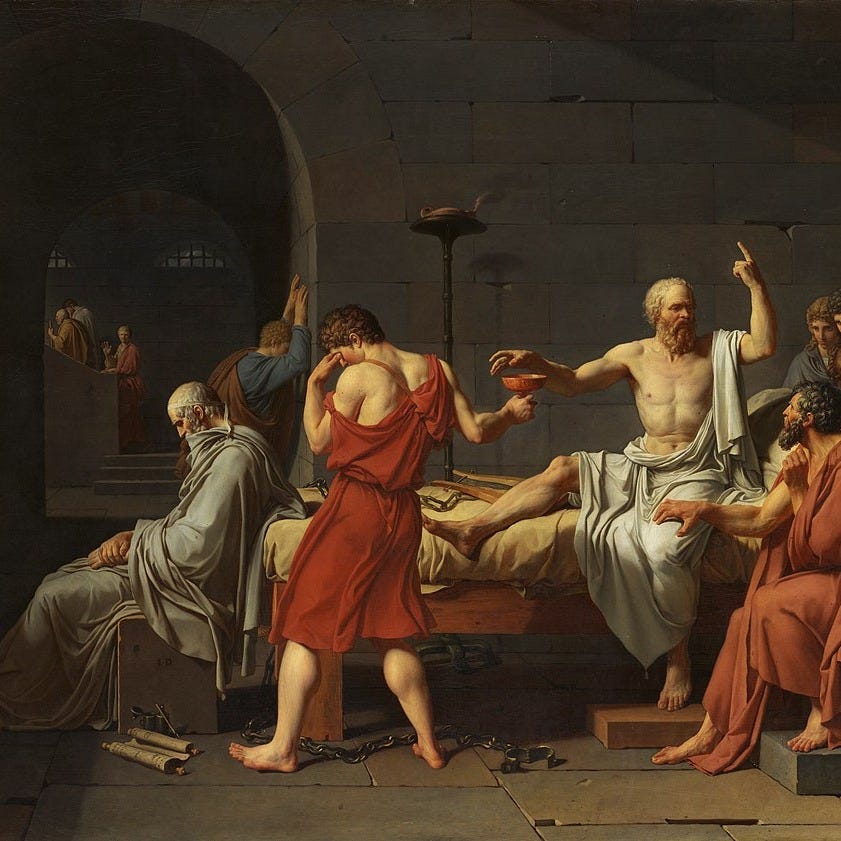Is the Soul Immortal?
Facing death without fear in Plato's Phaedo
Is the soul immortal?
When Socrates was in prison awaiting his execution, you would think it would be his friends who were comforting him, but it was Socrates who was comforting his friends.
How could Socrates maintain such peace in the face of death?
He believed the soul was immortal and that death would be a good.
He did not fear death—but his friends did. Like Theseus slaying the Minotaur to save the Athenian youth, so too in Plato’s Phaedo does Socrates attempt to slay the fear of death and save his friends from its effects.
To do this, he gives them four arguments for the immortality of the soul.
Not sterile, academic arguments—but arguments meant to comfort the soul and bring it peace in the face of death and invite it to live a beautiful life.
And if Socrates, a pagan, can be so confident and serene in the face of death, how much more so should Christians (who have the revelation of Jesus Christ) be?
Reminder: this is a teaser of our members-only deep dives.
To support our mission and get our premium content every week, upgrade for a few dollars per month. You’ll get:
New, full-length articles every Tuesday and Friday
The entire archive of members-only essays
Access to our paid subscriber chat room
Socrates awaits his death with peace
The death of Socrates is recorded in Plato’s Phaedo, which is a beautiful, profound dialogue that shows a Socrates who faces death with remarkable peace, humor, and philosophical depth. Plato alludes at the beginning that Socrates is like the mythic hero Theseus, and as Theseus navigated the labyrinth to slay the Minotaur, so will Socrates navigate the labyrinth of philosophical inquiry to slay the fear of death—for Socrates, who is going to die, finds his friends gripped by fear.
While the drama of the dialogue is pedagogically rich, the Phaedo is known for presenting four arguments for the immortality of the soul: cyclical, recollection, affinity, and final cause. “Argument” here is a strong word, as Socrates is philosophizing about the soul, death, and the afterlife—in other words, he is arguably discussing subjects at the limits of human reason. As such, his arguments are more akin to rational suggestions, e.g., “is it not more likely true that…” or, in other words, Socrates builds a case in the Phaedo that, though not ultimately provable, there are good, solid reasons to believe the soul is immortal—and that this belief in the immortality of the soul brings peace, comfort, and hope in the face of death.
Socrates, a pre-Christian pagan, is bereft of divine revelation; thus, to understand the truths of the soul, death, and the afterlife, he must take philosophy to the very edge of its capacity to discern such matters.
Socrates’ Second Sailing
In the Phaedo, arguably the best argument for the immortality of the soul is the so-called “final cause” argument. It comes after Socrates gives his own intellectual biography (95b–99d). Socrates explains that he first tried to understand the world through material causes. Many of the famous pre-Socrates philosophers held that the world and all within it was the result of material forces, and they philosophized that everything was made of water or fire or of various material causes. Socrates tried this approach, but was ultimately dissatisfied with a flat, material (empirical) explanation of reality. But, why did he think this explanation of the world fell short?
Socrates wanted to know the purpose of things. In Greek, the world for purpose is telos, and thus teleology (telos+logos) is the study of purposes or ends. The materialist understanding of reality did not explain the purpose or why of things. For example, the material cause can explain how you walk across the room—it speaks of muscles, limbs, sinews, gravity, etc., but none of that can explain why you walked across the room. Socrates did not want to know simply how things existed but why they existed—what was their purpose or telos?
Socrates shifting from a material causation to a study of purpose is known as his “second sailing.” The phrase comes from when a ship has its first sailing with the wind and then, when the winds die, the ship must have its second sailing under the power of its own oars. Socrates, by his own efforts, moved to embrace what is call “final causality,” which the final cause of a thing is the telos for which it was made. And this moves Socrates into a pursuit of what is good, for if things are made with a purpose, then all things have a good for which they were made.
For example, if you understand the purpose of the knife is to cut, then you can understand that a good knife is sharp and a bad knife is dull. You would also understand what is good for the knife, like a whet stone, and what is bad for the knife, i.e., anything that impeded its purpose, like dulling it or making it brittle. You would also then understand the arete (virtue) of the knife, e.g., to cut and cut well, a knife must be sharp and durable; and you would understand the vice or lack of excellence of a knife, e.g., dull and brittle. In other words, understanding the final cause (telos) of a thing is intimately tied to its goodness, and this insight allows you to understand the true logos of that thing, its ordering principles or essence—this is what Socrates started to seek in all things, especially those things that were most informative of all other good things: the true, the good, and the beautiful.
But, what does this have to do with the immortality of the soul?
Well, Socrates applies this argument of final causality to the soul in an attempt to free his friends from the fear of death.




